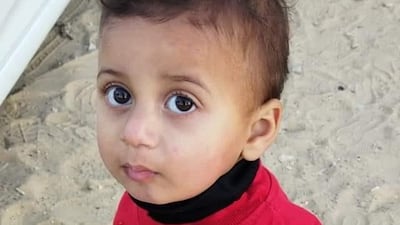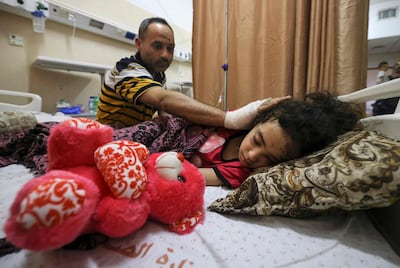When The National compiled images of all 70 children killed in this month's Gaza war, it was not just their faces that depicted the senselessness of this terrible loss of young life. The names did, too. Scrolling through the top of the list, the first three children to appear bear the surname Al Masry. Rahaf, 10, Marwan, 6, and Yazan, who was just 12 months old, were all killed on May 10 in Beit Hanoun, a northern part of the Gaza Strip.
In Palestine and too many places of conflict in the Middle East, families often have to contend with living perilously close to death. This fear has innumerable consequences for young people. The National also reported that at least 12 of the children killed in Israeli strikes were already dealing with psychological disorders linked to the trauma of growing up under occupation. Nightmares are a part of childhood. For the majority they are not grounded in reality. This is not the case for the new generation of Palestinians, like all children living through war. Their parents will find it a lot harder to tell them they have nothing to fear.
Death and physical injury happens to an unlucky minority. But the mental impact of seeing classmates suffer these fates is far more pervasive, denying young people their right to a proper childhood and endangering the many crucial developmental milestones that are reached during one's early years. It is impossible to educate and nurture talent in a child as war rages. Whether in the displacement camps sheltering victims of Syria's civil war, or the migrant centres of Europe, too many children from this region are beginning their lives in turmoil.
In Yemen, almost 4 million children live in governorates where education has been disrupted, according to Unicef. In Syria, schools and hospitals have been hit by barrel bombs. In Gaza, they have turned into shelters. The UN Office for the Co-ordination of Humanitarian Affairs has said 48,000 people sought shelter in Gaza's 48 UNRWA-run schools, which are considered to be some of the only safe havens left. They might be considered secure for now, but with a building that housed international media outlets lying in ruins after the latest round of fighting – breaking longstanding norms over the right for journalists to report free from danger – it is not unreasonable for Gazans to fear that schools could also be targets.
At the same time as we learnt of these tragedies, luckier children around the region were showing the world what they can achieve if given the right support. In mid-May, Saudi 12-year-old Ritaj Alhamzi broke a Guinness World Record to become the youngest author of a series of novels. Young people from the Middle East’s war zones are denied such opportunities. Unicef estimates that there are more than 61 million children living in areas affected by conflict in the region. That is more than a third of the children in Mena.
Nonetheless, they continue to win their own minor victories. The story of Nariman, 7 from Palestine went viral as the world learnt of her successful mission to rescue a pet goldfish and two canaries from the bombed ruins of her home.
Stories such as Nariman's remind us that children are resilient. But there is no hiding from the lifelong impact that the region’s many conflicts will have on young minds, and the horrible fact that in too many parts of the Middle East, the nightmare of premature death does not disappear in the morning.
While you're here
Salem Al Rayyas and Ahmed Maher: The Lost Children



